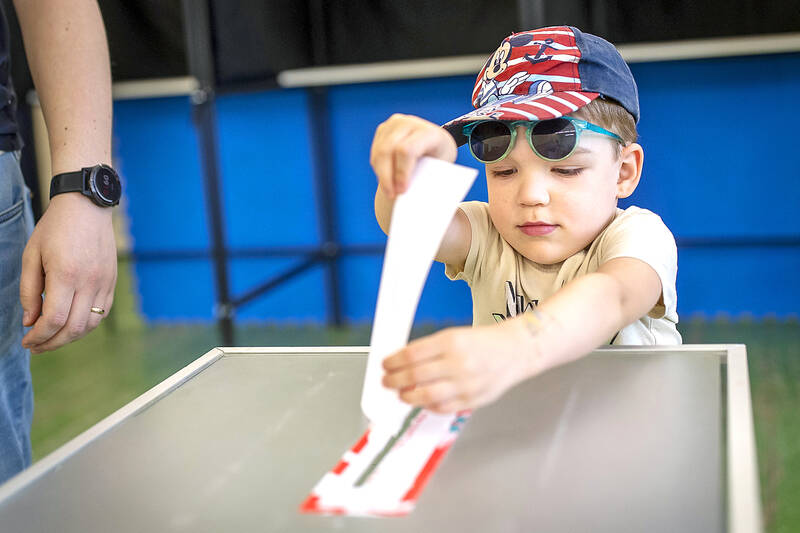Lithuania’s heads of state and government yesterday faced off in round two of the presidential election, as the Baltic nation prioritizes defense and security amid fears over neighboring Russia.
Both candidates agree that the NATO and EU member of 2.8 million should boost defense spending to counter the perceived threat, and to that end the government recently proposed a tax increase.
Former banker and incumbent Lithuanian President Gitanas Nauseda, 60, is the heavy favorite to win another five-year term, saying he expects to receive 75 percent of the votes.

Photo: AP
There have been no opinion surveys since the first round, when Nauseda received 44 percent of the ballot while Lithuanian Prime Minister Ingrida Simonyte got 20 percent.
Simonyte, the 49-year-old candidate of the ruling conservatives, is running for president again after losing to Nauseda in the last presidential runoff. The Lithuanian president steers defense and foreign policy, attending EU and NATO summits, but must consult with the government and parliament on appointing the most senior officials.
While the candidates agree on defense, the uneasy relationship between Nauseda and Simonyte’s ruling conservatives has at times triggered foreign policy debates, most notably on Lithuania’s relations with China.
Bilateral ties turned tense in 2021, when Vilnius allowed Taiwan to open a de facto embassy under the nation’s name.
The move was a departure from the common diplomatic practice of using the name of the capital, Taipei, to avoid angering Beijing, which responded by downgrading diplomatic relations with Vilnius and blocked its exports.
Nauseda sees the need to change the name of the representative office, while Simonyte pushes back against it.
Early voter Arturas Samoilenko said Simonyte had his support.
“She is the better of the two,” the 34-year-old marketing specialist said. “She would be more supportive of human rights.”
Pensioner Ausra Vysniauskiene for her part opted for Nauseda.
“He’s an intelligent man, he speaks many languages, he’s educated, he’s a banker,” the 67-year-old said. “I want men to lead, especially when the threat of war is so big.”
Lithuania is a significant donor to Ukraine and is already a big defense spender, with a military budget equal to 2.75 percent of GDP.
This week, Simonyte’s government came forward with proposals that could help raise defense spending to 3 percent.
Lithuania fears it could be next in Russia’s crosshairs if Moscow were to win its war against Ukraine.
Yet for voters, personal differences between the candidates, as well as economic policy and human rights, seem to matter more.
Simonyte is known for her sense of humor and for writing her own social media posts.
She draws support from liberal voters in bigger cities and traditional conservative voters.
“I would like to see faster progress, more openness ... more tolerance for people who are different from us,” Simonyte said when casting an early vote.
Nauseda, who maintains a moderate and measured stance on nearly all issues, has established himself as a promoter of the welfare state.
“The past five years have shown that I have tried to achieve the goals I set,” he said while casting an early vote.
Polling stations close at 8pm, with no exit polls expected.

When Shanghai-based designer Guo Qingshan posted a vacation photo on Valentine’s Day and captioned it “Puppy Mountain,” it became a sensation in China and even created a tourist destination. Guo had gone on a hike while visiting his hometown of Yichang in central China’s Hubei Province late last month. When reviewing the photographs, he saw something he had not noticed before: A mountain shaped like a dog’s head rested on the ground next to the Yangtze River, its snout perched at the water’s edge. “It was so magical and cute. I was so excited and happy when I discovered it,” Guo said.

Chinese authorities said they began live-fire exercises in the Gulf of Tonkin on Monday, only days after Vietnam announced a new line marking what it considers its territory in the body of water between the nations. The Chinese Maritime Safety Administration said the exercises would be focused on the Beibu Gulf area, closer to the Chinese side of the Gulf of Tonkin, and would run until tomorrow evening. It gave no further details, but the drills follow an announcement last week by Vietnam establishing a baseline used to calculate the width of its territorial waters in the Gulf of Tonkin. State-run Vietnam News

TURNAROUND: The Liberal Party had trailed the Conservatives by a wide margin, but that was before Trump threatened to make Canada the US’ 51st state Canada’s ruling Liberals, who a few weeks ago looked certain to lose an election this year, are mounting a major comeback amid the threat of US tariffs and are tied with their rival Conservatives, according to three new polls. An Ipsos survey released late on Tuesday showed that the left-leaning Liberals have 38 percent public support and the official opposition center-right Conservatives have 36 percent. The Liberals have overturned a 26-point deficit in six weeks, and run advertisements comparing the Conservative leader to Trump. The Conservative strategy had long been to attack unpopular Canadian Prime Minister Justin Trudeau, but last month he

Four decades after they were forced apart, US-raised Adamary Garcia and her birth mother on Saturday fell into each other’s arms at the airport in Santiago, Chile. Without speaking, they embraced tearfully: A rare reunification for one the thousands of Chileans taken from their mothers as babies and given up for adoption abroad. “The worst is over,” Edita Bizama, 64, said as she beheld her daughter for the first time since her birth 41 years ago. Garcia had flown to Santiago with four other women born in Chile and adopted in the US. Reports have estimated there were 20,000 such cases from 1950 to